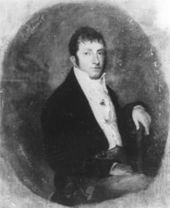Robert Ward Johnson
This article includes a list of general references, but it lacks sufficient corresponding inline citations. (March 2013) |
Robert Ward Johnson | |
|---|---|
Attorney General of Arkansas | |
| In office February 3, 1843 – September 25, 1843 | |
| Governor | Archibald Yell |
| Preceded by | New office |
| Succeeded by | George C. Watkins |
| Personal details | |
| Born | July 22, 1814 Scott County, Kentucky, U.S. |
| Died | July 26, 1879 (aged 65) Little Rock, Arkansas, U.S. |
| Cause of death | Dysentery |
| Resting place | Mount Holly Cemetery, Little Rock, Arkansas, U.S. 34°44′15.3″N 92°16′42.5″W / 34.737583°N 92.278472°W |
| Political party | Democratic |
| Spouses | Sarah Frances Johnson
(m. 1836–1862)Laura S. Johnson
(m. 1863) |
| Children | 6 |
| Parent |
|
| Relatives | Conway-Johnson family |
| Alma mater | St. Joseph's College |
| Occupation | Farmer, planter, lawyer |
| Profession | Agriculture, legal |
| Signature | |
Robert Ward Johnson (July 22, 1814 – July 26, 1879) was an American planter and lawyer who served as the senior Confederate States senator for Arkansas, a seat that he was elected to in 1861. He previously served as a delegate from Arkansas to the Provisional Congress of the Confederate States from 1861 to 1862.
Early life and education

Robert Ward Johnson was born on July 22, 1814, in
In 1821 when Johnson was seven, his parents moved the family to
At times, 200–300 boys attended the academy. The Choctaw students were at the school in the period prior to the
After St. Joseph's, Johnson returned to Little Rock. He studied law as a legal apprentice and was admitted to the bar in 1835. He married Sarah Frances Smith in 1836. They had six children together; three survived to adulthood. Sarah died in 1862, during the American Civil War. The next year, Johnson at the age of 49 married her younger sister, Laura. They had no children.
Political career
In Little Rock, Johnson soon became involved in Democratic Party politics. He was elected as the prosecuting attorney for Little Rock and served from 1840 to 1843. He effectively acted as the state's attorney.
His sister Juliette married
Prior to the American Civil War, Johnson moved his family to
Johnson declined to run for reelection in 1852. He was appointed by the legislature to the
Later life and death
The American Civil War ended Johnson's political career. Property damage and the abolition of slavery ruined him economically. After the war, he practiced law in Washington, D.C., for more than a decade. Returning to Arkansas in the late 1870s, he ran unsuccessfully for reelection to the Senate in 1878. Johnson died in Little Rock in 1879. He is buried in the historic Mount Holly Cemetery there.
See also
- List of Freemasons
- List of Confederate States senators
- List of people from Kentucky
- List of slave owners
- List of United States representatives from Arkansas
- List of United States senators from Arkansas
References
- ^ a b c d "Robert Ward Johnson (1814-1879)", Encyclopedia of Arkansas History and Culture, accessed 12 November 2013
- ^ a b Carolyn Foreman, "The Choctaw Academy" Archived June 17, 2008, at the Wayback Machine, Chronicles of Oklahoma, Volume 6, No. 4, December 1928, accessed 12 November 2013
Further reading
- Address of Robert W. Johnson, to the Citizens of Arkansas. Washington: Jno. T. Towers. 1850 – via Internet Archive.
- Johnson, R. W.; OL 22895434M – via Internet Archive.
- Lewis, Elsie M. (Spring 1954). "Robert Ward Johnson: Militant Spokesman of the Old-South-West". The Arkansas Historical Quarterly. 13 (1). Arkansas Historical Association: 16–30. JSTOR 40037953.
- Speech of Mr. Johnson of Arkansas, in the C. S. Senate, February 9th, 1864, on the Bill to Limit and Define the Terms of Office of the Principal Officers or Heads of Departments. Richmond: James E. Goode. 1864. OCLC 06836906 – via Internet Archive.
